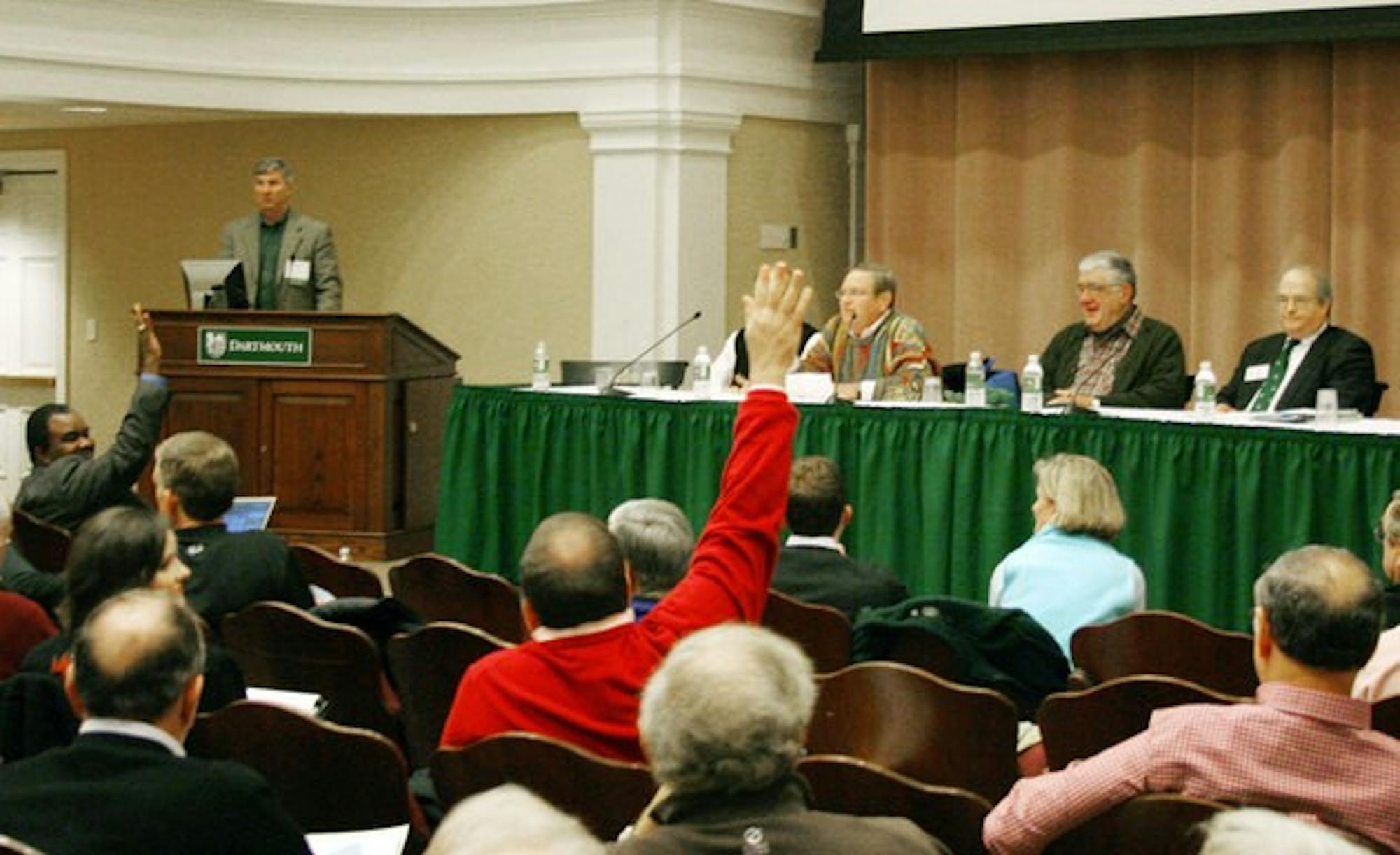Zywicki's Oct. 27 address to the John William Pope Center, a conservative education think tank in Raleigh, N.C., first came to light after several Ivy League-specific websites posted the transcript and video from the event. Zywicki has drawn fire from alumni for his assertion that former College President James Freedman was a "truly evil man," that higher education is dominated by an "orthodoxy" of political correctness and that donations to universities are driven by ulterior motives.
"The new dogma is environmentalism and feminism and that is the dogma and they will enforce it viciously," Zywicki said in his remarks, adding later, "And I think what you have to understand is that those who control the university today, they don't believe in God and they don't believe in country."
Zywicki later said in an interview with The Dartmouth that he misspoke in the latter statement.
It is unclear whether Zywicki's comments represent a violation of the trustees' oath of office, although the Board of Trustees Chairman Ed Haldeman '70 said in a previous interview with The Dartmouth that he was "surprised and disappointed" by Zywicki's comments, and suggested that Zywicki's actions may be added to the agenda for discussion at the trustees' next meeting.
The Alumni Council's resolution, which passed 62 to one, and with one abstention, describes Zywicki's criticism of the College as "inappropriate, and contrary to Dartmouth's best interests."
The transcript of Zywicki's speech has also been made available on the council's website and a direct link is available on the menu bar.
Zywicki, when reached by telephone, asked a reporter for The Dartmouth to "call members of the Alumni Council" and ask them "if they believe that James Freedman's behavior as president of the College was appropriate or not."
Given the late hour, council members could not be contacted on this subject by press time.
The council's agenda this weekend, however, was not limited to a discussion of Zywicki's remarks. The council was successful in passing a new constitution outlining its system of governance.
The weekend was also punctuated by the council's panel discussion with members of the association's executive committee. The Dartmouth Hall discussion revealed the extent of the split between the two groups.
This split is partly the result of the association's ongoing lawsuit against the College. The council, which filed a brief on behalf of the College, has argued that it is the only representative body and is therefore the only organization with the authority to sue. The brief asked the Grafton County Court to dismiss the lawsuit filed by the association, arguing that the association did not have the authority to take such action.
The panel discussion was billed as an explanation of the association's role within the College and included attendance by some of the organization's leaders.
David Spalding '76, a member of the executive committee and vice president for Alumni Relations, said that the Association was created to organize the elections of the alumni representatives, whereas the council's role is to nominate alumni for positions on the Board of Trustees and also to be the "chief means of communication between the College and alumni."
This view was opposed by association executive committee member Tim Dreisbach '71, who said that the council has recently been expanding beyond its traditional role. Dreisbach voted for the lawsuit, while Spalding voted against it.
"The association has primacy for alumni in governance matters beyond being 'ceremonial and vestigial,'" he said, quoting the amicus brief filed by the council in November. "Recognize this and we can begin working together," he added.
The lawsuit was filed in October in response to the College's attempt to add eight appointed trustees to the board. This ended a century-old tradition of parity between the number of trustees elected by alumni and those selected by the board itself.
Several members of the Council present at the panel argued that the lawsuit was filed without consent of the general body of alumni.
David Bradley '58, a representative for the Classes of 1957 and 1958, said that he had recently surveyed members of those classes to find whether or not they support the lawsuit.
"Sevemty percent of the people I surveyed were against the lawsuit," he said. "[The] same percentage was in favor of the amicus brief."
Last summer, 92 percent of the 5,000 alumni surveyed by the association's executive committee said that they supported parity on the board. The committee had no means to quickly conduct similar surveys regarding the lawsuit, Dreisbach said.
Council members at the panel were also troubled by the anonymity of the donors funding the association's legal effort.
"When we decided to bring the lawsuit, no one came to tell us 'We back you up,'" said Frank Gado '58, another member of the executive committee who voted for the lawsuit. "It was entirely our action, and we had to get a legal representation."
Hutchinson said that he has requested documents to identify the source of the funding to ensure that conflict of interest is not involved. This request, however, has been denied by the appointed law firm, because he is "not the client," Hutchinson said.
Gado said that he has deliberately chosen not to know who provides funds.
"Regardless the source of the funds, it is the executive committee that is directing actions at the law firm," Dreisbach agreed. "As long as there are no strings attached, it doesn't matter that the donor stays anonymous."
When asked by The Dartmouth how students should understand the association's lawsuit, despite early attempts to compromise between the various parties, Council President-elect J.B. Daukas '84 had no specific advice for students.
"They shouldn't," he said. "No one does."




